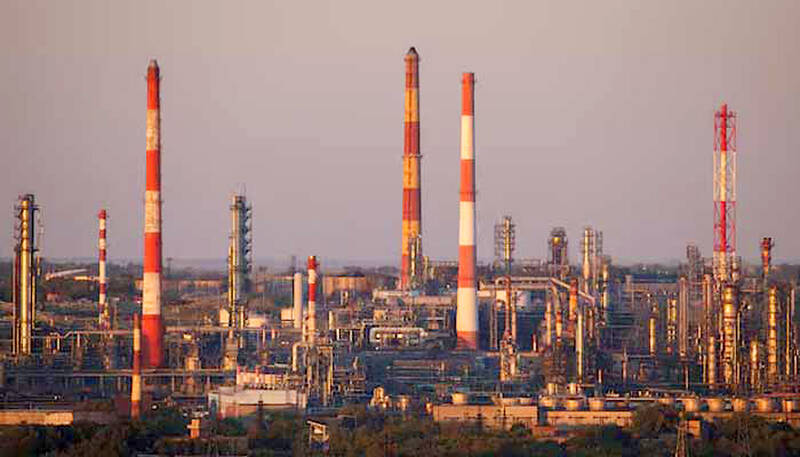EU countries yesterday agreed to phase out their remaining gas imports from Russia by the end of 2027, breaking a dependency the bloc has struggled to end despite Moscow’s war on Ukraine.
Energy ministers meeting in Luxembourg approved a plan by the European Commission to phase out pipeline gas and liquefied natural gas (LNG) imports from Russia, subject to approval by the bloc’s parliament.
Lars Aagaard, minister for climate, energy and utilities of Denmark, which holds the EU’s rotating presidency, called it a “crucial” step to make Europe energy independent.

Photo:Reuters
The plan is part of a broader EU strategy to wean the bloc off Russian energy supplies.
“Although we have worked hard and pushed to get Russian gas and oil out of Europe in recent years, we are not there yet,” Aagaard said.
The commission is in parallel pushing for LNG imports to be phased out one year earlier, by January 2027, as part of a new package of sanctions aimed at sapping Moscow’s war chest.
However, sanctions need unanimous approval from the EU’s 27 nations, which has at times been hard to reach. Trade restrictions like those approved yesterday instead require the backing of a weighted majority of 15 countries.
All but Hungary and Slovakia, which are diplomatically closer to the Kremlin and still import Russian gas via pipeline, supported the latest move, diplomats said.
“The real impact of this regulation is that our safe supply of energy in Hungary is going to be killed,” Budapest’s top diplomat, Peter Szijjarto, told reporters.
His government says the landlocked country needs to import gas from Russia due to geographical constraints.
Under the proposal, Russian gas imports under new contracts would be banned as of Jan. 1 next year. Existing contracts would benefit from a transition period, with inflows under short-term contracts allowed until June 17 next year and those under long-term contracts until Jan. 1, 2028.
Although gas imports from Russia via pipeline have fallen sharply since the invasion of Ukraine, several European countries have increased their purchases of Russian LNG transported by sea.
Russian gas still accounts for an estimated 13 percent of EU imports this year, worth more than 15 billion euros (US$17.5 billion), according to Brussels.

REVENGE: Trump said he had the support of the Syrian government for the strikes, which took place in response to an Islamic State attack on US soldiers last week The US launched large-scale airstrikes on more than 70 targets across Syria, the Pentagon said on Friday, fulfilling US President Donald Trump’s vow to strike back after the killing of two US soldiers. “This is not the beginning of a war — it is a declaration of vengeance,” US Secretary of Defense Pete Hegseth wrote on social media. “Today, we hunted and we killed our enemies. Lots of them. And we will continue.” The US Central Command said that fighter jets, attack helicopters and artillery targeted ISIS infrastructure and weapon sites. “All terrorists who are evil enough to attack Americans are hereby warned

‘POLITICAL LOYALTY’: The move breaks with decades of precedent among US administrations, which have tended to leave career ambassadors in their posts US President Donald Trump’s administration has ordered dozens of US ambassadors to step down, people familiar with the matter said, a precedent-breaking recall that would leave embassies abroad without US Senate-confirmed leadership. The envoys, career diplomats who were almost all named to their jobs under former US president Joe Biden, were told over the phone in the past few days they needed to depart in the next few weeks, the people said. They would not be fired, but finding new roles would be a challenge given that many are far along in their careers and opportunities for senior diplomats can

Seven wild Asiatic elephants were killed and a calf was injured when a high-speed passenger train collided with a herd crossing the tracks in India’s northeastern state of Assam early yesterday, local authorities said. The train driver spotted the herd of about 100 elephants and used the emergency brakes, but the train still hit some of the animals, Indian Railways spokesman Kapinjal Kishore Sharma told reporters. Five train coaches and the engine derailed following the impact, but there were no human casualties, Sharma said. Veterinarians carried out autopsies on the dead elephants, which were to be buried later in the day. The accident site

The death of a former head of China’s one-child policy has been met not by tributes, but by castigation of the abandoned policy on social media this week. State media praised Peng Peiyun (彭珮雲), former head of China’s National Family Planning Commission from 1988 to 1998, as “an outstanding leader” in her work related to women and children. The reaction on Chinese social media to Peng’s death in Beijing on Sunday, just shy of her 96th birthday, was less positive. “Those children who were lost, naked, are waiting for you over there” in the afterlife, one person posted on China’s Sina Weibo platform. China’s